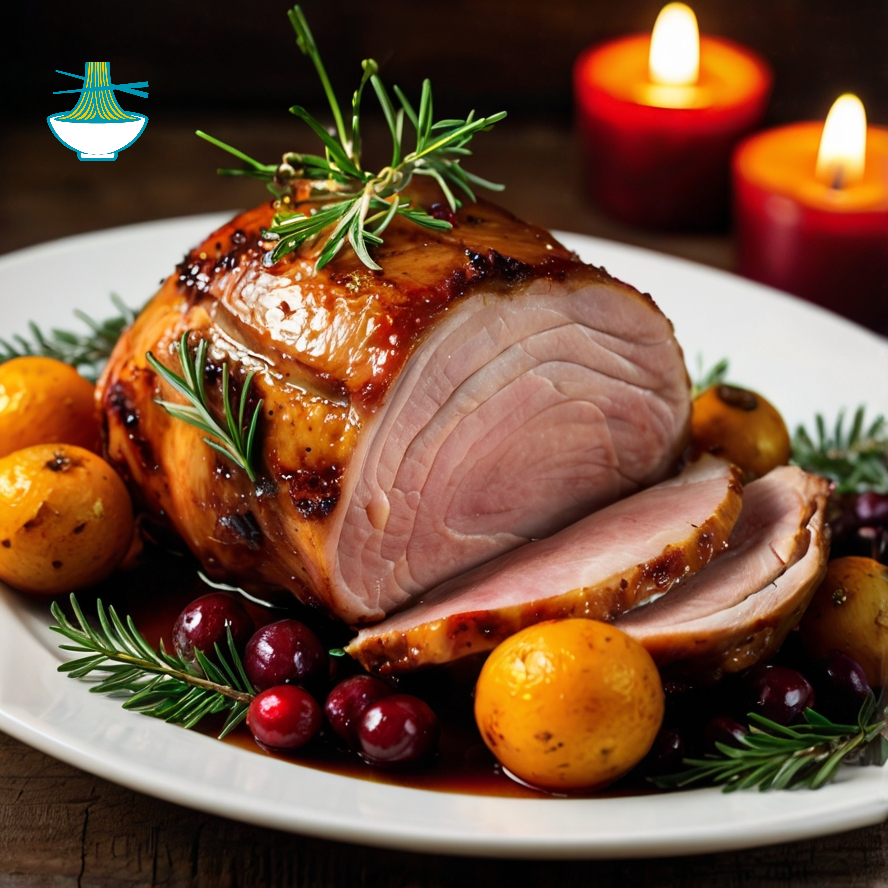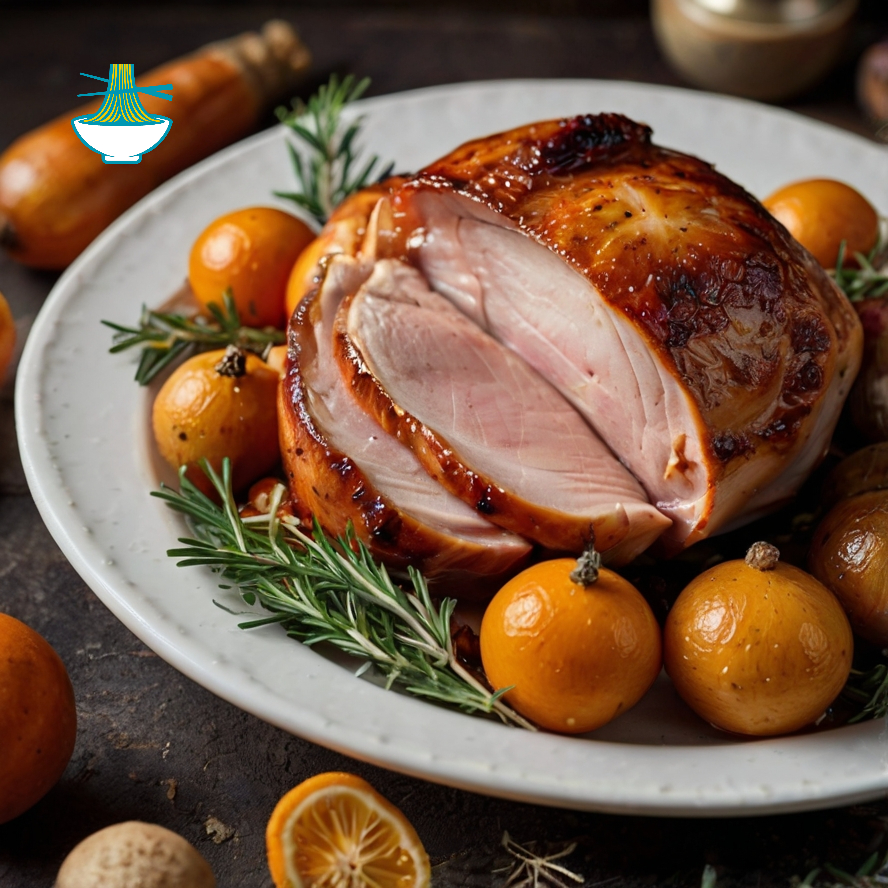Learn how to roast a whole pig for your next celebration with our step-by-step guide. From selecting the right pig to achieving crispy skin and tender meat, this recipe will ensure your roast pig is a hit at any gathering.
Roasting a whole pig is a grand affair, often reserved for special celebrations. Here's a basic recipe to guide you through the process:
Ingredients:
- 1 whole pig (around 50-80 pounds)
- Salt
- Pepper
- Garlic powder
- Onion powder
- Paprika
- Olive oil
Instructions:
1- Prepare the pig by cleaning it thoroughly, removing any organs and hair. Pat dry with paper towels.
2- Score the skin of the pig with a sharp knife, making diagonal cuts about an inch apart. This will help the skin crisp up during roasting.
3- Season the pig generously inside and out with salt, pepper, garlic powder, onion powder, and paprika. You can also add other spices or herbs according to your preference.
4- Preheat your grill or smoker to around 250-300°F (120-150°C). You'll need a large cooking surface for a whole pig.
5- Place the pig on the grill or smoker, belly-side down. Close the lid and let it cook for several hours, depending on the size of the pig. A general rule of thumb is around 1-1.5 hours per 10 pounds of meat.
6- Occasionally check the pig and baste it with olive oil to keep it moist and help the skin crisp up.
7- Use a meat thermometer to check the internal temperature. The meat should be cooked to at least 160°F (70°C) in the thickest part of the pig.
8- Once the pig is cooked, carefully remove it from the grill and let it rest for a few minutes before carving.
9- Carve and serve the roast pig with your favorite sides and enjoy the fruits of your labor with friends and family!
Note: Roasting a whole pig is a time-consuming process that requires careful attention and planning. It's recommended to seek advice from experienced cooks or professional caterers if you're attempting this for the first time.
Nutritional Values:
Here's a general breakdown of the nutritional values for the ingredients typically used in a roast pig recipe. Keep in mind that the actual values can vary based on the size of the pig and the specific ingredients used:
Whole Pig (100g):
- Calories: 242
- Protein: 26.5g
- Fat: 14.5g
- Carbohydrates: 0g
- Fiber: 0g
- Sugars: 0g
benefits:
- Rich in protein: Provides essential amino acids necessary for muscle growth and repair.
- Source of essential nutrients: Contains vitamins and minerals such as iron, zinc, and B vitamins.
- High-quality protein: Supports satiety and helps maintain muscle mass.
Salt (1 tsp):
- Calories: 0
- Protein: 0g
- Fat: 0g
- Carbohydrates: 0g
- Fiber: 0g
- Sugars: 0g
benefits:
- Electrolyte balance: Essential for maintaining proper hydration and nerve function.
- Flavor enhancement: Enhances the taste of food without adding calories.
- Preservation: Helps to preserve food by inhibiting the growth of bacteria and fungi.
Pepper (1 tsp):
- Calories: 6
- Protein: 0.3g
- Fat: 0.1g
- Carbohydrates: 1.5g
- Fiber: 0.6g
- Sugars: 0g
benefits:
- Antioxidants: Contains compounds like piperine, which may have antioxidant properties.
- Digestive health: Stimulates the secretion of digestive enzymes, aiding in digestion.
- Anti-inflammatory effects: May help reduce inflammation in the body.
Garlic Powder (1 tsp):
- Calories: 9
- Protein: 0.4g
- Fat: 0g
- Carbohydrates: 2g
- Fiber: 0.2g
- Sugars: 0g
benefits:
- Immune support: Contains compounds like allicin, which may help boost the immune system.
- Heart health: May help lower cholesterol and blood pressure levels.
- Antimicrobial properties: Has been used traditionally for its antimicrobial effects against bacteria and fungi.
Onion Powder (1 tsp):
- Calories: 8
- Protein: 0.2g
- Fat: 0g
- Carbohydrates: 2g
- Fiber: 0.4g
- Sugars: 0.8g
benefits:
- Antioxidant content: Contains flavonoids and sulfur compounds with potential antioxidant properties.
- Anti-inflammatory effects: May help reduce inflammation in the body.
- Heart health: May have beneficial effects on cholesterol levels and blood pressure.
Paprika (1 tsp):
- Calories: 6
- Protein: 0.3g
- Fat: 0.3g
- Carbohydrates: 1.2g
- Fiber: 0.7g
- Sugars: 0.2g
benefits:
- Rich in antioxidants: Contains carotenoids like beta-carotene, which have antioxidant properties.
- Eye health: Beta-carotene is converted into vitamin A in the body, which is essential for eye health.
- Anti-inflammatory effects: May help reduce inflammation and oxidative stress.
Olive Oil (1 tbsp):
- Calories: 119
- Protein: 0g
- Fat: 14g
- Carbohydrates: 0g
- Fiber: 0g
- Sugars: 0g
benefits:
- Heart health: Rich in monounsaturated fats, which may help lower bad cholesterol levels and reduce the risk of heart disease.
- Anti-inflammatory properties: Contains oleocanthal, a compound with potential anti-inflammatory effects.
- Antioxidant content: Contains vitamin E and polyphenols, which have antioxidant properties and may help protect cells from damage.
Please note that these values are approximate and can vary based on factors such as cooking methods and specific brands of ingredients used.


Comments